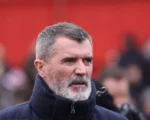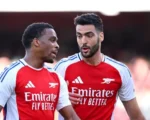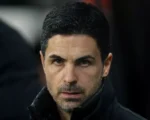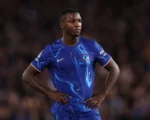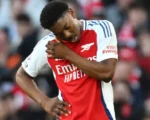We were able to sit down with four-time NBA champion and future Hall of Famer Stephen Curry at his annual Curry Camp in California back in August. Curry and a host of former and current pros played host to the next generation of stars as the top high school girls and boys rolled up to learn the secrets of a long career. In the middle of the camp’s second day, just before he put on a shooting exhibition, Curry blessed us with a few minutes of his time to discuss a whole lot of different topics.
SLAM: What is the smallest detail of basketball that you can share with us?
Stephen Curry: Probably breathing. My skills coach Brandon Payne always talks about breathing is a skill. And I think for the young kids it’s beneficial but they can kinda get away with it just because they’re so energetic and young they don’t even need to warm up these days. They just go out there and hoop. But the deeper you get into your career being able to control your breathing, like, recovery, controlling your nerves, all those types of things. I’ve really tried to master that in the last five, six years. Nobody would really know you’re doing it while you’re doing it.
SLAM: Physical and mental at the same time?
SC: Exactly. Just connecting that. That’s an all-the time-thing. It doesn’t matter if it’s, you know, in my training sessions or training camp or preseason or regular season or Finals, whatever it is, like, it’s always a fine detail of kind of mastering the game.
SLAM: Beautiful. What have you learned from kids?
SC: It’s just a reminder of, you know, there’s a lot of different approaches to the game. You know, they’re so talented and skilled and they all have different strengths and weaknesses, but being able to put them in a position where they’re tested with the details of balance and mechanics and processing information, like, that cycle always kind of reveals itself. I keep telling them, even in my 15th year, going into my 15th year in the League, I’m still trying to perfect the stuff that I’m teaching them. And they’re probably learning for the first time. They remind you of that journey. We all started from somewhere. They’re a lot better than I was when I was their age. Just understanding, like, I still feel like I can get better, so I hope that they hear that and then watching them get bright-eyed when I tell them something like that just gives me so much juice. This game is such a beautiful game.
SLAM: It is so beautiful and I want to get back to the kids in a second. But the way that you’re talking about the game to me, it really makes me think about intention and instinct and how basketball exists on this bridge of intention and instinct. What’s the clearest way that you can illustrate where instinct takes over when you’re on the court?
SC: I mean we drill it in some of the sessions that we’ve had out there where Coach McKillop, he mentioned he wants to train players to be detailed but free and the freedom comes in being able to just make decisions and be able to see the floor and try and make it almost slow motion. Like, the way that you can process information, where your defender is, where the other 8 guys that are on the court are. Time and score, you know, the flow of the game, all that type of stuff. You could talk about it for hours. Like, examining every single game you watch on TV, how many decisions are being made on every possession. I think that’s why every play is different, every game is different. Being able to understand who you are as a player, play to your strengths, but then process information within the game… When you can master that and then the game slows down the instincts are like… it’s almost like you’re Spider-Man out there for a little bit where you can just kinda bend the game to your will a little bit. And there’s confidence that comes with that too.
SLAM: Can you run me through what your senses of sight, touch, and hear are doing in those moments where you become Spider-Man?
SC: That’s a good question. I feel like it’s one of those things where it’s hard to explain just because everything just feels in sync. You’re not really hearing the crowd, even if there’s, like, 18,000-19,000 people in the stadium, you don’t really feel it. You feel like you’re by yourself out there. There’s a little bit of inner conversation going on, almost like narrating what’s going on in real time. But the flow of the game, or I guess the flow of your senses are all just in sync. And it’s a fun space to be in when you have that much control over the game.
SLAM: Have you seen any of the kids demonstrate anything close to that?
SC: They all have their moments for sure, and I think even, like, Cooper Flagg, when he’s out there, he’s one that shows just a know-how and a confidence and a basketball I.Q. Always trying to make the right play at all times. He obviously can show his athleticism and his overall skill set, but he’s one that I’ve seen that’s never really in a hurry out there. And for the high school level that’s hard to find cause they’re so athletic, so fast, they rely on that. But he almost plays like an NBA style at, whatever he is, 16. So that like… watching that, you can see it. You can see the little difference in just his pace and his overall know-how. But, I mean, all the guys are showing it in terms of being able to make plays, show their dominance at certain times within the sessions that we run. That’s why they’re here, they’re all top notch talents. Both the boys and girls.
SLAM: Most definitely. Yeah, the girls have been killing it all weekend too. I have a very nerdy shooting question for you. I see you and Klay [Thompson] do this all the time. So depending on where your momentum is carrying you, going left, you guys will break and start to fade back to your right. Going right, you’ll carry all the way into your momentum, like, run into the shot. Why does that work?
SC: It’s something that you just drill and it just feels comfortable. Now I gotta break down why that is. I feel like… well a lot of it too is because the ball… for me, like, when you’re going to the left you’re most likely dribbling with your left hand. And so it’s really hard to take your last dribble and do a pick up–we’re getting really nerdy now–dribble the last ball, or your last dribble, pick it up and it’s coming back to the right hand at some point so that momentum almost slows your whole body down to a certain extent. And then to get power and all that you’re carrying that energy up as opposed to letting it carry you in that same direction. Conversely, on the right side if it’s the hard pound and the last dribble is with the right hand there’s not any energy going back this way cause you’re not going to throw it back over here then go that way and shoot. It’s just gonna be kinda up into the shot pocket. So you can kind of carry that energy with you a little bit easier, especially as a right-handed shooter. Because it’s all about flow, right? The ball is going to dictate where the flow and the energy is going. So going to the left is kind of coming back into your shot pocket so it’s going to slow your body down a little bit. To the right, it’s not really moving but up so your body is gonna carry it with you. And you just want to be in as much constant rhythm as possible while you’re shooting. That’s balance, I guess, in terms of mechanics.
SLAM: Which I’ve heard you talk about a million times. I’ve heard you talk about your feet a million times too. Why do you not hop on your shot anymore?
SC: I’m getting old.
SLAM: Is that the real answer? That’s for real?
SC: It’s just, uh… efficient, efficient movement. So, I think that’s really the best way to explain it. When you create space or however you’re doing it, the last thing you want to do is give up that space by unnecessary movements. So maybe just getting a little bit more efficient with getting off the ground quicker. You get deeper into your career, you’re not going to be as explosive as you once were. Even for me to say explosive, I’m not above the rim, but there’s an explosiveness in terms of short movements, quick change of pace, change of direction, all that type of stuff so, just being as efficient as possible.
SLAM: Yeah, it always bugs me out when people say you’re not athletic.
SC: There’s a lot of different definitions of that term. Athleticism, hand eye coordination, all that. I’m somewhere in there.
SLAM: Last night you got to give the kids the Curry 11 for the first time. I know you can’t share a
ton about it. What can you tell us about the Curry 11 at this moment?
SC: First off, just it being the 11th edition of your signature product is crazy, knowing
how long we’ve been on this journey. Feel like we’re continuing to get better with, not just the innovation behind the shoes and the technology we have in there, there’s more Flow which is something we’ve been doing since Curry 8. And so, we’ll continue to elevate that tech adding a couple layers on the upper that we’ll share a little bit more detail later, but it’s just the next edition of a product that has really helped me in terms of traction, in terms of change of direction and being able to have that good fit out there on the court. And then where I feel like we’ve developed in terms of the storytelling around the colorways and all that. That’s something that we want to share throughout this whole journey, so I’m looking forward to truly unveiling it come this fall.
SLAM: And is that something you can talk about, the story you gave the kids last night about being outside and loving nature?
SC: Yeah, I got a little bit of the Curry Camp swag on right now, but got to give them the
Curry 11 “Curry Camp” colorway that will be just exclusive for them as kind of a perk for being invited to this camp and this experience. But yeah, a lot of the outdoor theme, the outdoor colors, we told them we’re going camping so we wanted to bring that colorway story throughout all the products that we did for the camp this year and the one that they got it screams that. So I think they loved it.
The post Q+A: Stephen Curry on Breathing, Shooting and The Next Generation of Stars appeared first on SLAM.
